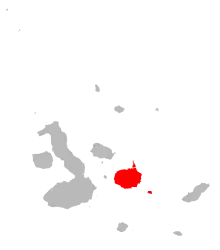| Santa Cruz lava lizard | |
|---|---|
 | |
| Male | |
 | |
| Female | |
| Scientific classification | |
| Domain: | Eukaryota |
| Kingdom: | Animalia |
| Phylum: | Chordata |
| Class: | Reptilia |
| Order: | Squamata |
| Suborder: | Iguania |
| Family: | Tropiduridae |
| Genus: | Microlophus |
| Species: | M. indefatigabilis |
| Binomial name | |
| Microlophus indefatigabilis (Baur, 1890) | |
 | |
| Synonyms | |
|
Tropidurus indefatigabilis | |
The Santa Cruz lava lizard (Microlophus indefatigabilis) is a species of lava lizard endemic to the Galapagos island of Santa Cruz.[2]
Description
They are identifiable by a brown body with scattered black and white blotches with a distinctive red and black throat and a black chest. Females have a more uniform brown body, a bright orange face, and a black mark at shoulder level. The species is able to shed its tail without mortal injury.[3] The
Sexual dimorphism
Harems are kept, and are competed for by males using a pushup ritual to avoid physical injury. Males have a higher stamina and greater body size compared to the female.[4]
Distribution
Endemic to Santa Cruz Island, it is found within volcanic rock areas, dry shrublands, dry grasslands, deciduous forests, and urban areas, and prefers shaded locations.[3]
References
- ↑ Márquez, C.; Cisneros-Heredia, D.F. (2016). "Microlophus indefatigabilis". IUCN Red List of Threatened Species. 2016: e.T88793749A88793762. doi:10.2305/IUCN.UK.2016-1.RLTS.T88793749A88793762.en. Retrieved 19 November 2021.
- ↑ Benavides, Edgar; Baum, Rebecca; Snell, Heidi M.; Snell, Howard L. & Sites Jr., Jack W. (2009). "Island biogeography of Galápagos lava lizards (Tropiduridae: Microlophus): species diversity and colonization of the archipelago" (PDF). Evolution. 63 (6): 1606–1626. doi:10.1111/j.1558-5646.2009.00617.x. PMID 19154379. S2CID 13598047. Archived from the original (PDF) on 2013-09-21. Retrieved 2012-01-09.
- 1 2 "Santa Cruz Lava-Lizard (Microlophus indefatigabilis) | Tropical Herping". www.tropicalherping.com. Retrieved 2019-10-16.
- ↑ Jennings, Snell HL (1988). "Intrapopulation variation in predator-avoidance performance of Galápagos lava lizards: the interaction of sexual and natural selection". Evolutionary Ecology. 2 (4): 353–369. doi:10.1007/BF02207566. S2CID 9955874.
